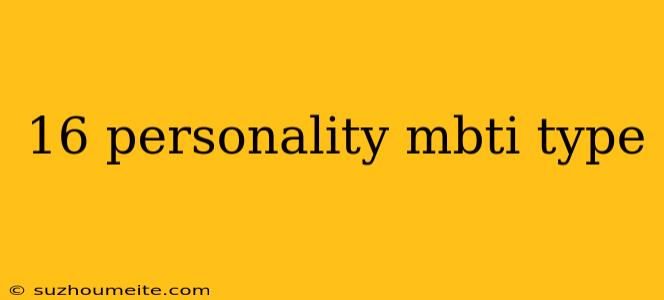Understanding the 16 Personality Types of MBTI
The Myers-Briggs Type Indicator (MBTI) is a popular personality framework used to understand individual personality types. Based on the work of Carl Jung, MBTI categorizes individuals into 16 personality types, each with its unique characteristics, strengths, and weaknesses.
The Four Dimensions of Personality
The MBTI framework is based on four dimensions of personality:
Extraversion (E) vs. Introversion (I)
- Extraverted individuals tend to focus on the outer world, are outgoing, and energized by social interactions.
- Introverted individuals tend to focus on their inner world, are reflective, and energized by alone time.
Sensing (S) vs. Intuition (N)
- Individuals with a sensing preference tend to focus on concrete, factual information and tend to be detail-oriented.
- Individuals with an intuitive preference tend to focus on patterns, possibilities, and the big picture.
Thinking (T) vs. Feeling (F)
- Thinking individuals tend to make decisions based on logical analysis and objective criteria.
- Feeling individuals tend to make decisions based on values, emotions, and personal beliefs.
Judging (J) vs. Perceiving (P)
- Judging individuals tend to be planned, organized, and decisive.
- Perceiving individuals tend to be flexible, adaptable, and spontaneous.
The 16 Personality Types
Here are the 16 personality types, each with its unique combination of preferences:
ISTJ - The Logistician
- Practical, detail-oriented, and organized, ISTJs are known for their reliability and sense of duty.
ISFJ - The Defender
- Warm, helpful, and conscientious, ISFJs are known for their dedication to others and their ability to create a sense of stability.
INFJ - The Advocate
- Creative, empathetic, and idealistic, INFJs are known for their passion for helping others and making a positive difference.
INTJ - The Architect
- Innovative, strategic, and independent, INTJs are known for their ability to think outside the box and bring new ideas to the table.
ISTP - The Virtuoso
- Resourceful, analytical, and flexible, ISTPs are known for their ability to solve complex problems and adapt to new situations.
ISFP - The Artist
- Gentle, compassionate, and creative, ISFPs are known for their sensitivity to the emotions of others and their ability to create beauty.
INFP - The Idealist
- Empathetic, imaginative, and optimistic, INFPs are known for their idealism and their desire to make a positive difference.
INTP - The Thinker
- Logical, analytical, and independent, INTPs are known for their ability to think critically and conceptually.
ESTP - The Entrepreneur
- Adventurous, energetic, and action-oriented, ESTPs are known for their ability to take risks and seized opportunities.
ESFP - The Entertainer
- Spontaneous, enthusiastic, and people-oriented, ESFPs are known for their ability to entertain and bring joy to others.
ENFP - The Campaigner
- Charismatic, spontaneous, and imaginative, ENFPs are known for their ability to inspire and motivate others.
ENTP - The Debater
- Innovative, entrepreneurial, and persuasive, ENTPs are known for their ability to think outside the box and convince others of their ideas.
ESTJ - The Executive
- Practical, decisive, and action-oriented, ESTJs are known for their ability to take charge and get things done.
ESFJ - The Consul
- Warm, compassionate, and organized, ESFJs are known for their ability to create a sense of community and support.
ENFJ - The Protagonist
- Charismatic, empathetic, and influential, ENFJs are known for their ability to inspire and motivate others.
ENTJ - The Commander
- Confident, strategic, and decisive, ENTJs are known for their ability to lead and bring about change.
Conclusion
Understanding the 16 personality types of MBTI can help individuals gain insights into their strengths, weaknesses, and preferences. By recognizing our own personality type, we can improve our personal and professional relationships, make informed career choices, and develop a more fulfilling life.
